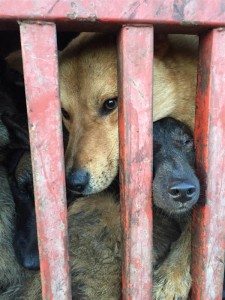Supporting and fighting for animal welfare can be upsetting. When you love animals, it is all the more disturbing when confronted by images or footage that depict cruelty, neglect, and suffering at the hands of humans.
This can certainly be applied to companion animals, like cats and dogs. That’s not to say cats and dogs are more important than any other animal, but we can more easily relate: we evolved with dogs – they are bred to live with us, to be loved by us, and are considered by most to be more than just pets… they’re family.
Growing up I remember people making off-colour jokes about eating dogs, but the idea of eating a dog seemed so outlandish, so preposterous, that I thought it couldn’t possibly be real. How wrong I was.
I work for Humane Society International/Canada, a non-profit international organization dedicated to protecting animals. I recently participated in a rescue operation, helping to remove 50 dogs from a neglect situation in a Quebec town. It was upsetting to see puppies forced to live in conditions like what I saw, but their story has a happy ending – with time and love, they’ll recover and find forever families. If only all dogs were as lucky.
Up to 10 million dogs are believed to be killed for their meat in China every year, with as many as 10,000 killed for an actual dog meat “festival” in the Chinese city of Yulin. Eating dog meat is often wrongly assumed to be a Chinese tradition – the Yulin festival was in fact invented as recently as 2010 by dog meat traders as a way to boost business. Dog meat in China is very much a culinary sub-culture and not part of the mainstream.
The sight of it all is enough to make you cry – squat, rusty cages crammed full of dogs are ferried by motorbike on their way to slaughter. Caged animals—some skinny and missing fur, some who appear healthy but are afflicted with a look of empty resignation—are treated like edible flesh. Men who mill around the market carry big sticks and long-handled tongs, sort of like giant pliers, with which they can grab dogs by the neck and pull them, helpless, upward and out of the cages for buyers. When the men need to move dogs from one cage to another, they prod them again and again with the sticks and the tongs, indifferent to their cries of pain.
Eating dog meat has become increasingly controversial in China, and the domestic and international campaigns to end it are having an impact. In 2011, a dog meat festival in Jinghua was shut down as a result of protest by Chinese campaigners, and in Guangzhou a dog meat restaurant that had run for 51 years was recently closed. Ten years ago, dog slaughter on the streets of Beijing’s suburbs was a common sight, but it’s unheard of in the city now. However, we have a long way to go before this cruel trade is ended for good.
The good news is that more and more people are speaking out against this inherently cruel practice – people like Hong Kong entrepreneur turned philanthropist turned film director Genlin, who produced and directed a documentary – perhaps the first of its kind – that exposes the dog meat trade. Eating Happiness offers stark facts, like how 30 million dogs worldwide are killed annually, 70 percent of which are believed to be stolen pets. It also dispenses with the popular misnomer that dog meat is consumed because it is a cheap source of protein – not true. In fact, it is more expensive than pork, chicken, or even beef. The film has screened for audiences in Milan, London and Toronto, where it is up for a spot in the Toronto International Film Festival (official selections announced on August 11). To bring this issue to mass audience would be a huge accomplishment.
I’ll give the final word to comedian Ricky Gervais, an outspoken critic of the commercial dog meat trade: “I want you to know I have hope. I’ve seen video footage, and it breaks my heart. I will never forget the look of bewilderment and fear on the faces of these poor animals — no animal deserves to be treated like this.”
Speak out against the cruel dog meat trade – sign the pledge.
 Montreal Dog Blog Montreal's Online Dog Park
Montreal Dog Blog Montreal's Online Dog Park





